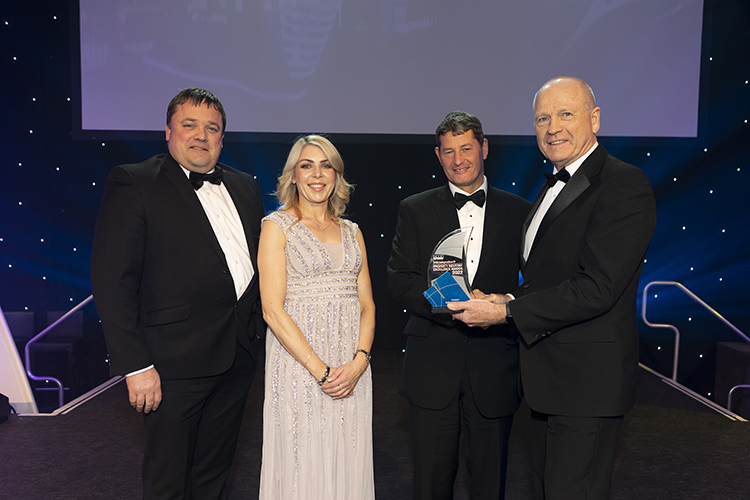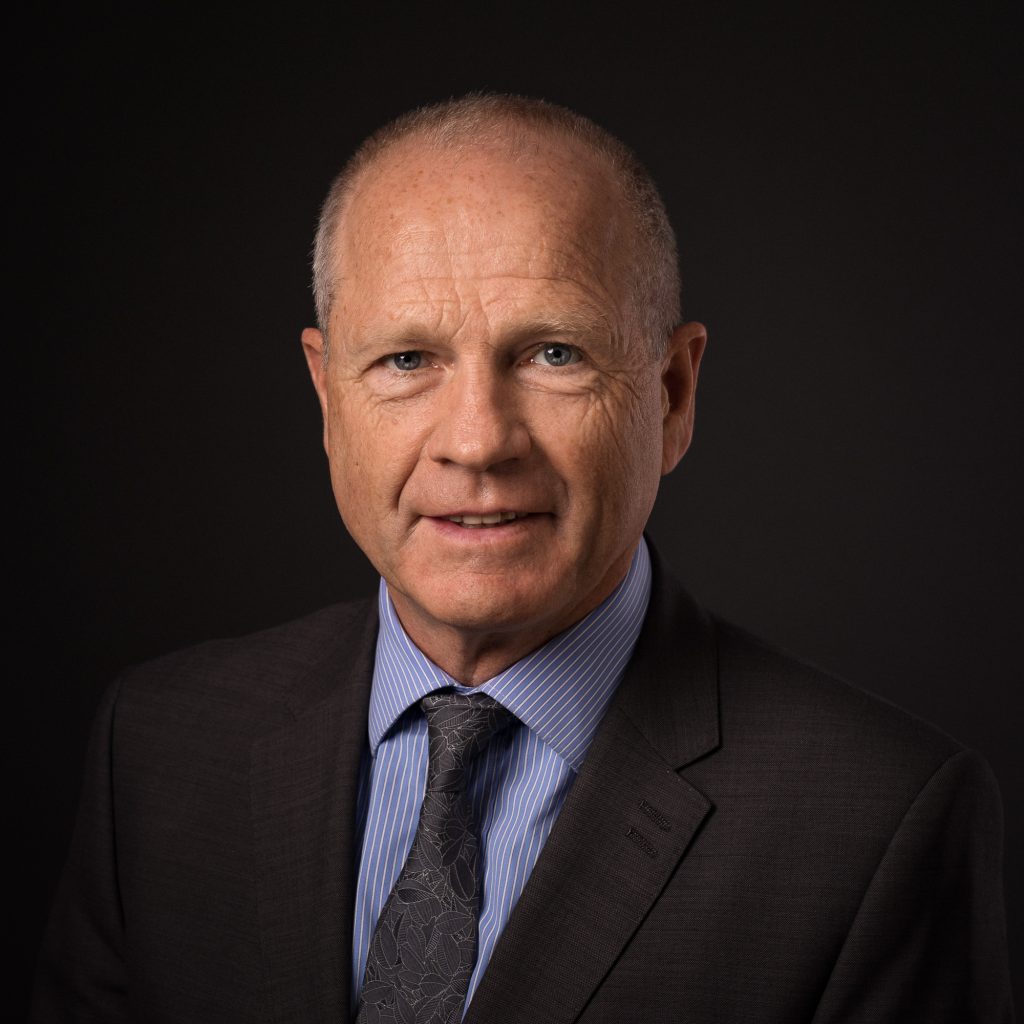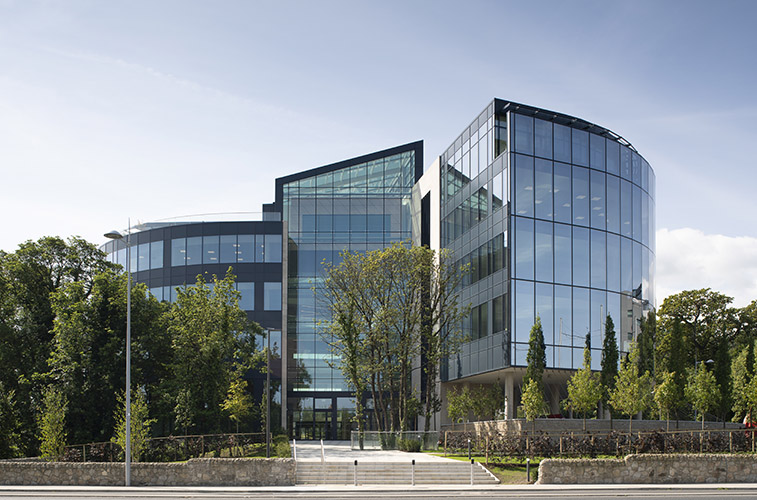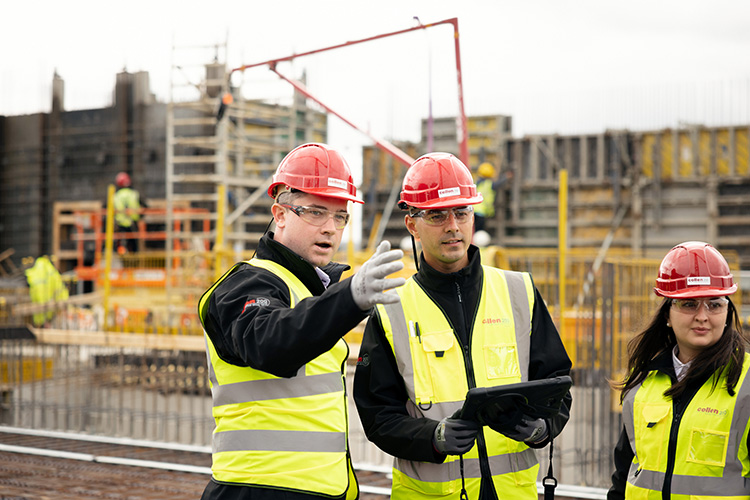
The Collen Legacy – “Construction is a remarkable place to work at this time”

With over 45 years on the clock, Tommy Drumm, Managing Director, Collen Construction, is a vastly experienced construction leader. He speaks with BARRY MCCALL about the joy he still gets daily from working in Ireland’s most exciting and rewarding business sector.
Tommy Drumm has seen it all during his long career in the construction industry, which dates back to the late 1970s with Collen, where he spent four years as a young engineer. He agreed in 2014 to return to the company. The Collen Construction managing director has worked with some of the biggest names in the business and has gained considerable international experience.
Tommy Drumm
“Construction is a remarkable industry in which to work. There are few industries where one can go around the world and find work in different cultures, see different approaches to construction, safety, quality and so on,” Tommy Drumm notes. “Construction is unique in that sense.”
Crises management
He describes 2022 as a challenging year for the company and the industry.
“Getting through the previous two years of Covid-19 was hugely challenging,” he says. “But we devised a Covid-19 operating procedure, and that was very positive. Many of our projects continued throughout Covid, including data centres in Sweden and Germany.”
No sooner had the industry emerged from Covid when another crisis came along in the form of Russia’s invasion of Ukraine. “The war in Ukraine was a big shock to the system. Prices of commodities increased significantly. For example, copper and rebar doubled. Inflation became a massive issue as well. Building is ultimately all about managing costs. This not only goes for our company. We can see from the accounts of other general contracting companies at home and abroad that they are doing okay if they achieve 2% net margins. The global financial crisis was not long ago. Ireland still has massive debt, so additional shocks to the system like Covid and Ukraine are difficult. The interest rate environment remains significant. 2022 was all about cost control, and many suppliers would only give quotes for a limited period, sometimes only daily, in the aftermath of Ukraine, but thankfully that is settling.”
Despite these challenges, Collen did reasonably well, he believes.
“We probably did okay during the year. Our turnover was between €400m and €500m in each of the past three years. We pulled back a bit last year, if anything, to assess the market. Our order book is very healthy for 2023 and 2024, and we will probably see a step change for the company in the coming year. But one has to be careful forecasting when market conditions remain unstable. We are glad to have left such a difficult year behind.”

Irish Property Industry Contractor Of The Year
It wasn’t all gloom, though. There were several high points, not least winning the ‘Contractor of the Year’ award at the Irish Property Industry Excellence Awards, having secured the same accolade from the Irish Construction Industry Awards in 2019 and 2021.
“It is great for the team to get that independent recognition,” Tommy Drumm continues. “As a team, we believe we do a good job, but it’s ultimately what clients think that really matters. One of our clients, Cyril McGuire, co-worked with us on a video as part of the award submission. He gave his personal client views of what is important and how Collen performed against those benchmarks. That meant a lot to us.”
Cyril Maguire is the former Trintech Group PLC CEO, and his Infinity Capital company developed the landmark One and Two South County buildings in Leopardstown in Co Dublin. Collen Construction was the main contractor on both projects. “Cyril McGuire invested in a very high-quality design,” Tommy points out. “Curved glazed buildings are not cheap. Cyril insisted on meeting our construction team and visiting another project our team were constructing before deciding to appoint Collen. Once the projects commenced, Cyril attended every meeting. It’s great to work with a client like that.”
Another highlight of 2022 was the completion of a six-storey over basement building in Dublin’s Smithfield for the Linders family.
“The building is adjacent to the Luas track in Smithfield, so there were lots of technical challenges involved, but working with people like Pat and Joe Linders, whose family have been committed to the Smithfield area for 85 years, was inspiring.”
These close relationships exemplify Collen’s approach to business in general.
“Our model is to try to win repeat business. When we win work with a new client, getting to know one another takes time. By the time the project is finished, we have become well acquainted. By then, it is easier for both parties to decide on follow-on work. Every construction project is complex, and everyone has to turn up to deal with issues as they arise. We deal with designers, specialists, subcontractors, suppliers, the workforce and the authorities. We get to work with a very diverse group of people. Our job is to make the client happy and to ensure that the building works for them as intended. We aim to build long-term working relationships with clients, in some cases working for the same clients for 10, 20 and 25 years.”
Tommy Drumm points to Collen’s data centre business as an example of such relationships.
“Collen started working for one particular hyperscale data centre client in Ireland in 2010 and went to Germany for them in 2013 for their first data centre project outside of Ireland. We then worked with them in Sweden in 2017. We started working for a second hyperscale data centre client in Ireland in 2018, from which we have secured follow-on work in Sweden and Denmark.
“We are still working for both of these clients,” he adds. “Last year was a good one for our data centre business. In addition to our hyperscale clients, we also worked with two co-location data centre clients.
“Outside of Ireland, Collen only builds data centres, so we are clear in messaging that to the market. Last year, we extended our operations from Ireland, Sweden and Germany into Finland, Denmark, and the UK.”
A family business
Tommy Drumm believes the company’s heritage as a family business has much to do with its success over the years.
“Neil Collen, our chairman, is the seventh generation of the family to work in the business, and his sons Jack and Peter are now the eighth generation. The company was founded 213 years ago, in 1810. Neil’s son Jack joined us five years ago, and after recently completing a design and build substation in Drogheda for one of our hyperscale clients, he transferred to Denmark. Peter completed his DPhil at Oxford University recently, and his research involved designing and constructing a wind tunnel to model landings on Mars. Peter now heads our innovation department, and we have invested in a medium-term project with TU Dublin to work on R&D. This partnership is really exciting.”
Addressing planning issues
When looking at issues affecting the industry generally, Tommy Drumm points to the planning system as requiring urgent attention.
“The planning system is certainly struggling as things stand. It seems to make sense that vital infrastructure projects for the benefit of Irish society and the Irish economy are assured of progressing in a transparent but reasonably timely fashion. Our economy relies heavily on foreign direct investment. We still have a significant national debt, so our medium-term target, with our ageing population, must be to stimulate and support the projects that make Ireland attractive and efficient. The recently published Planning and Development Bill 2022 will help this situation.
Construction contracts
Tommy Drumm says that the thorny issue of contracts needs to be finally addressed if the government is serious about delivering on its Project Ireland 2040 ambitions.
“The yellow form of contract was common before the financial crisis, but the blue form is mainly used now, and it can be quite challenging,” he comments. “In many cases, we see 80 changes made to the standard form of contract. It was fairer when you got the client design, and if there was a change subsequently, you got reimbursed for it. Now the client is only prepared to give a blue form with these numerous alterations to the standard form of contract. Some prospective clients will issue a complicated design, not fully completed, with certain unknown risks, and want a fixed price. Some clients simply don’t want to take any risk. You must decide where the ‘red lines’ are in assessing potential opportunities. Some potential clients could wish to transfer risks of 10%, plus liquidated and ascertained damages (LADs) in some cases, on a contract’s costs that only offer a 2% net margin if all goes well. That doesn’t make sense. The UK seems to be a far more mature market in how these things are approached.”
There is also the issue of the improved quality of buildings. He believes that is a welcome development, but there is an added cost that comes with it.
“Luckily, the BCAR system gives end users huge comfort on quality and traceability, providing evidence of the source, design and installation of all elements, with that appropriate added value. But it comes at a cost. We are in a perfect storm of higher quality during a period of high inflation when the risk is all on the contractor’s side.”
There have been some improvements to the Public Works Contract (PWC). However, Tommy Drumm comments, “We did a few public works projects in 2014 and 2015, and we lost money on them. It was a really difficult experience. The bill of quantities was not a contract document. The entire contract was designed to eliminate risk for the government client. The intent of this form of contract is to have the design 100% complete. However, that rarely happens. When the project is not fully designed, it is set up to create conflict. Collen is not in the business of conflict. As a business, we do not start out on a contract looking for ways to put in claims to the client. Thankfully, this form of contract is improved, and the bill of quantities is now included in the contract. We now have a team looking at public works contracts again.”

The skills gap
Talent is another challenge for the industry.
“We are now at a historic low of 3.8% unemployment,” he says. “That’s lower than the 4.4% it was before the crash. That makes it very difficult to attract talent into the industry. Over 100,000 people left construction during the crash, and there are fewer people in the industry now than before the crash, at a time when the levels of activity are forecast to continue to increase.”
One answer is to attract a more diverse workforce.
“There is a much more diverse workforce in the industry in Europe,” he notes. “It is changing in Ireland, but only 8% of those working in the industry are women. We need to see that change. At 19% of our workforce, Collen has a higher-than-average number of women working for us. We have brought in some initiatives, including a family-leave scheme, which ensures no loss in remuneration to parents. This has gone down really well. To prove to prospective new employees that Collen is sincere about diversity, we have accreditation from the Irish Centre for Diversity, and our board has received the appropriate training. We were at the Bronze level, and this was brought it up to Silver last year, and we will keep working on it. We could only get Silver accreditation by involving the majority of our staff, who were hugely supportive.”
Apprenticeships are another way of recruiting talent. He believes the changes in the apprenticeship system by broadening the base of skills are really good for the industry.
“We still bring in apprentices, which has worked well for us over the years,” Tommy explains.
“Offsite construction (or the broader Modern Methods of Construction – MMC) is another way of making our industry more efficient by manufacturing elements of a building in safer factory conditions, unaffected by weather and on-site risks. CIF Director General Tom Parlon recently presented at a joint committee on Housing, Local Government and Heritage on the advantages that this offers, and the CIF believes this would double the industry’s output, which would be some achievement.”
Sustainability
Decarbonisation and sustainability are not just issues for construction, but the industry does face particular challenges in relation to them.
“The Intergovernmental Panel on Climate Change issued a stark warning recently,” Tommy Drumm says. “2022 was the sixth warmest year in history. The global population has doubled to eight billion in less than a century. Change is needed, and the government needs to do more to ensure Ireland will meet its climate change commitments by 2030.”
Progress is being made, however.
“It is fantastic to work for leading global companies and see what they are doing around decarbonisation and climate change,” he comments, adding, “Many of them are committed to being carbon negative and nature positive by 2030. We are learning from them. We are systematically going through our fleet and replacing it with hybrids or EVs, with the preference being for full EVs. We have planted 49 acres of woodland in Sligo as a carbon sequestration project. We are also employing other measures to improve biodiversity.
“Decarbonisation is going to be a major challenge for a carbon-intensive industry,” he admits. “But there have been some promising technological advances around concrete. The Irish Concrete Society is doing a lot of good work there. That’s quite exciting. By embracing new, greener concrete technologies through proactive engagement with Kilsaran and the design team/client, we saved circa 640 tonnes of CO2 on one of our hyperscale projects in Dublin. This is equivalent to dedicating over 20% of the building footprint to natural broadleaf forest and then maintaining it for 100 years.
“Using glulam technology to replace steel in buildings will also play a big role.
“Ultimately, the government needs to be doing as much as it can to incentivise and drive innovation in the sector.”
In conclusion
Tommy Drumm concludes by returning to the diversity theme. “I reach my 70th year next April and will move from MD to nonexecutive director for Collen. Last year, Collen completed a major strategic review of the business, and we are delighted to announce that Kara Stuart, with Collen since 2006, has been appointed to the new role of CEO, to prepare the way for significant anticipated sustainable growth. Kara is very active in the MBCA and will be part of a new generation of female construction leaders who will plot the course of the industry in the years ahead.”




